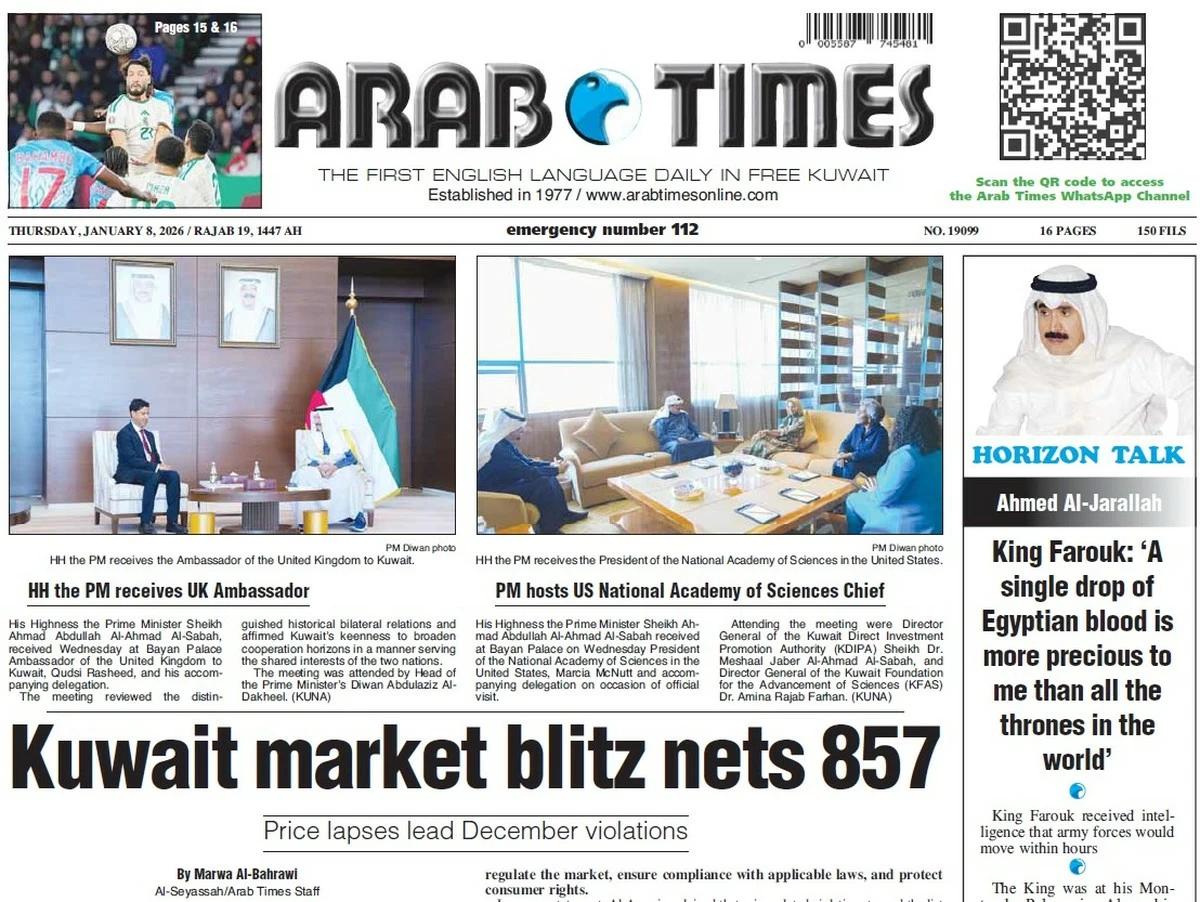09/09/2020
09/09/2020
KUWAIT CITY, Sept 9: The presentation of Finance Minister Barrak Al-Sheetan about the financial status of the country was the first item in the agenda of the National Assembly session on Tuesday. However, State Minister of National Assembly and Services Affairs Mubarak Al-Harees requested for a closed door session during the presentation due to the confidential nature of the figures included therein. Consequently, Assembly Speaker Marzouq Al-Ghanim asked the MPs to vote on the request and this led to its approval.
After the closed door session, the Assembly discussed the fifth report of the Budgets and Final Accounts Committee on the budget of the State for fiscal 2020/2021 and its final account for fiscal 2018/2019. Out of the 51 MPs and ministers present at the session, 32 voted in favor of the State budget while 19 voted against.
In addition, 27 MPs and ministers voted in favor of the final account of the State while 19 voted against. The Assembly approved the committee’s report and recommendations regarding the State budget and final account, and then referred them to the government.
The committee’s report said that the actual budget deficit amounted to about KD 1 billion (US$ 3 billion) and is covered by the general reserve money. Chairman of the committee MP Adnan Abdulsamad said the State budget for fiscal 2009/2010 was KD 11.250 billion, while that of fiscal 2020/2021 reached KD 21.5 billion. He pointed out this increase is within the normal range, but he finds it strange that the increase does not match the development of services. Instead, some services deteriorated despite the budget increase, he added. He cited as an example the KD 160 million budget for the health insurance of retirees.
He said this huge budget was supposed to result in the reduction of the Health Ministry’s expenditures, but the opposite happened as the expenses of the ministry increased. He called on the government to adopt the program-performance strategy which has been proven to be successful in many countries.
He also affirmed support for the Kuwaitization policy, but it should be implemented according to a well-planned and integrated strategy that takes into consideration the conditions of expatriate workers; especially those who have been living with their families in Kuwait for several years as they need more time to make the necessary arrangements. He stressed the importance of preparing the required national workers before terminating the expatriates. He urged the government to revise the structure of some institutions that cost a lot without giving anything in return such as the National Council for Human Rights whose director receives a monthly salary of KD 5,000 and the lower ranking employees receive an average of KD 3,000.
Harmful
Meanwhile, MP Abdullah Al-Romi emphasized the need for the government to set a good example for the citizens in terms of rationalization. He warned it is very harmful for the reputation of the government to announce that it will face problems in paying salaries within two months, while the Amiri Diwan unveils its plan to purchase two new airplanes.
He also underscored the need to restructure the distribution of national labor subsidy, such that those receiving high salaries are no longer entitled to the subsidy; in addition to reducing the number of messengers in ministries and public hospitals. MP Khalil Abul suggested granting monthly allowance to citizens who are underemployed and let them stay at home rather than paying them salaries without doing real work. MP Sa’adoun Hammad wondered about the difference between the oil extracting cost of $6 per barrel estimated by the Oil Ministry and the $12 per barrel estimate of the Finance Ministry.
MP Safa’a Al Hashem recommended a mechanism for the distribution of subsidies in a way that only citizens with limited income are given subsidy. She argued it is unacceptable that a citizen whose annual income is KD 10 million is receiving subsidized foodstuff and construction materials. She presented the idea of dividing the society into categories or classes in terms of salaries or income to serve as foundation of the tax system. She also asked the government to impose 100 fils road tax. MP Osama Al-Shaheen stressed the importance of monitoring the budgets of some institutions. He regards these institutions as blind spots as they are outside the monitoring of the State Audit Bureau (SAB) or Financial Controllers Bureau (FCB). He cited the Amiri Diwan as an example, indicating the diwan’s budget is equal to that of one ministry.
He clarified that he is referring to expenditures other than those allocated for His Highness the Amir. He praised the decision of the Budgets and Final Accounts to name the five worst institutions in terms of administrative and financial performance, wondering why the Ministry of Electricity and Water occupied two places in two indexes.
MP Ahmed Al-Fadl asserted Minister of Finance Barrak Al- Sheetan has no answers to the MPs’ questions. He also quoted Al- Sheetan as saying that the debt of Kuwait will reach KD 40 billion in the next five years. He added the senior officials at Kuwait Petroleum Corporation (KPC) are seizing the oil of Kuwait by manipulating the cost of oil extraction. He pointed out that every one dollar increase in production cost means $1 billion deduction from the annual revenues. He appealed to HH the Prime Minister Sheikh Sabah Al-Khaled to bear his responsibility and lay down the general strategy of the government, asserting this stage requires a one man-show rather than distributing power to ministers. Al-Ghanim adjourned the session until Thursday. Items in the agenda of Thursday’s session include voting on the no-confidence motions against Education and Higher Education Minister Dr Saud Al-Harbi and Interior Minister Anas Al-Saleh.
By Saeed Mahmoud Saleh Arab Times Staff


